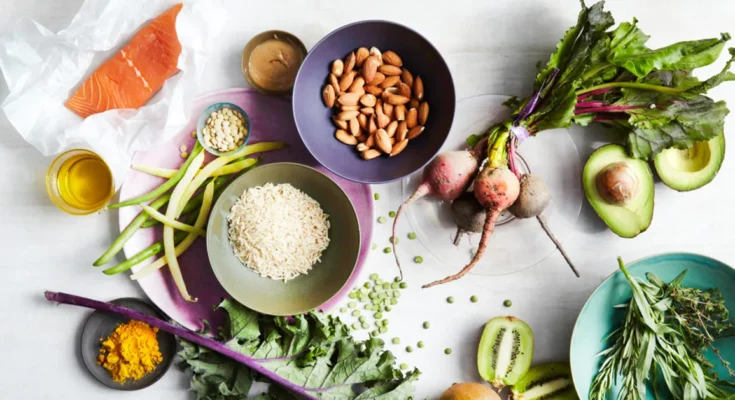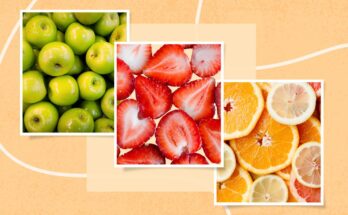Eating a balanced diet filled with nutrient-rich foods is key to maintaining long-term health and vitality. While no single food is a magic bullet for good health, there are certain foods that stand out for their exceptional nutrient profiles. These 20 foods offer a variety of health benefits, ranging from boosting energy levels to supporting heart health and improving digestion. Including them in your daily diet can help you optimize your health and well-being. Here’s a list of the healthiest foods you should consider adding to your everyday meals:
1. Leafy Greens (Spinach, Kale, Swiss Chard)
Leafy greens are a staple in any healthy diet due to their high concentrations of vitamins, minerals, and antioxidants. They are particularly rich in Vitamin K, which plays a vital role in bone health, and folate, which supports cellular function and DNA repair. Their fiber content also aids digestion and supports weight management.
2. Berries (Blueberries, Strawberries, Raspberries)
Berries are among the richest sources of antioxidants, particularly anthocyanins, which are known to reduce inflammation and protect cells from oxidative stress. Berries are also packed with fiber and vitamin C, which supports immune function and skin health.
3. Salmon (or Fatty Fish)
Salmon is loaded with omega-3 fatty acids, which are essential for heart health. These healthy fats can help lower blood pressure, reduce inflammation, and improve cholesterol levels. Additionally, salmon is a great source of high-quality protein and vitamin D, which supports bone health and immune function.
4. Nuts (Almonds, Walnuts, Cashews)
Nuts are an excellent source of healthy fats, protein, and fiber. They provide essential nutrients like magnesium, vitamin E, and omega-3 fatty acids. Studies have shown that regular nut consumption can help reduce the risk of heart disease, improve brain function, and regulate blood sugar levels.
5. Avocados
Avocados are nutrient-dense fruits that are rich in healthy monounsaturated fats, which help reduce bad cholesterol levels. They also contain a wealth of vitamins, including potassium, which helps regulate blood pressure. Their high fiber content supports digestion and aids in weight management.
6. Sweet Potatoes
Sweet potatoes are an excellent source of complex carbohydrates and provide a rich amount of beta-carotene, which the body converts into vitamin A. This nutrient supports healthy vision, skin, and immune function. They are also high in fiber, which supports gut health and helps regulate blood sugar levels.
7. Greek Yogurt
Greek yogurt is a high-protein dairy product that contains probiotics, which are beneficial bacteria that support gut health and boost immunity. It is also rich in calcium and vitamin D, both of which promote strong bones and teeth.
8. Chia Seeds
Chia seeds are a small but powerful superfood, packed with omega-3 fatty acids, fiber, and protein. They are also rich in antioxidants and minerals like calcium, magnesium, and phosphorus, which support bone health and muscle function.
9. Lentils
Lentils are an affordable and versatile plant-based protein source. Packed with fiber, vitamins, and minerals like folate, iron, and potassium, lentils support heart health, digestive function, and provide a steady source of energy. They are also great for managing blood sugar levels.
10. Tomatoes
Tomatoes are rich in lycopene, an antioxidant that has been shown to reduce the risk of certain cancers and improve heart health. They are also a good source of vitamin C, which helps boost the immune system and protect skin cells from damage.
11. Garlic
Garlic is a powerhouse of nutrients, including sulfur compounds that have anti-inflammatory and immune-boosting properties. Studies suggest that regular garlic consumption can help lower blood pressure, improve cholesterol levels, and reduce the risk of chronic diseases.
12. Turmeric
Turmeric contains curcumin, a potent antioxidant with powerful anti-inflammatory effects. It has been shown to support joint health, reduce the risk of chronic diseases, and improve brain function. Adding turmeric to your daily meals can enhance both flavor and health benefits.
13. Eggs
Eggs are one of the best sources of high-quality protein and are packed with essential vitamins and minerals, including vitamin B12, choline, and selenium. They are particularly important for muscle repair, brain function, and eye health.
14. Oats
Oats are a whole grain rich in soluble fiber, particularly beta-glucan, which has been shown to lower cholesterol levels and regulate blood sugar. They also provide sustained energy throughout the day and are a good source of vitamins, minerals, and antioxidants.
15. Citrus Fruits (Oranges, Lemons, Grapefruits)
Citrus fruits are packed with vitamin C, which is essential for immune function and collagen production. They are also rich in fiber, antioxidants, and flavonoids that help fight inflammation, lower blood pressure, and promote heart health.
16. Quinoa
Quinoa is a complete plant-based protein, meaning it contains all nine essential amino acids. It is also rich in fiber, magnesium, iron, and antioxidants. Quinoa is a great gluten-free grain option that supports digestive health and provides long-lasting energy.
17. Bell Peppers
Bell peppers are loaded with vitamin C, which boosts the immune system, supports skin health, and helps the body absorb iron. They are also rich in antioxidants like carotenoids, which protect against oxidative damage and support eye health.
18. Cabbage
Cabbage is a cruciferous vegetable that is packed with vitamins K and C, fiber, and antioxidants. It is known for its detoxifying properties, and its high fiber content helps support digestion and gut health.
19. Beets
Beets are rich in nitrates, which help improve blood flow and reduce blood pressure. They also contain powerful antioxidants, vitamins, and minerals that support liver health, brain function, and overall cardiovascular health.
20. Green Tea
Green tea is one of the healthiest beverages you can drink, packed with antioxidants called catechins that help protect against heart disease and lower the risk of certain cancers. It also has metabolism-boosting properties and can improve brain function and focus.



